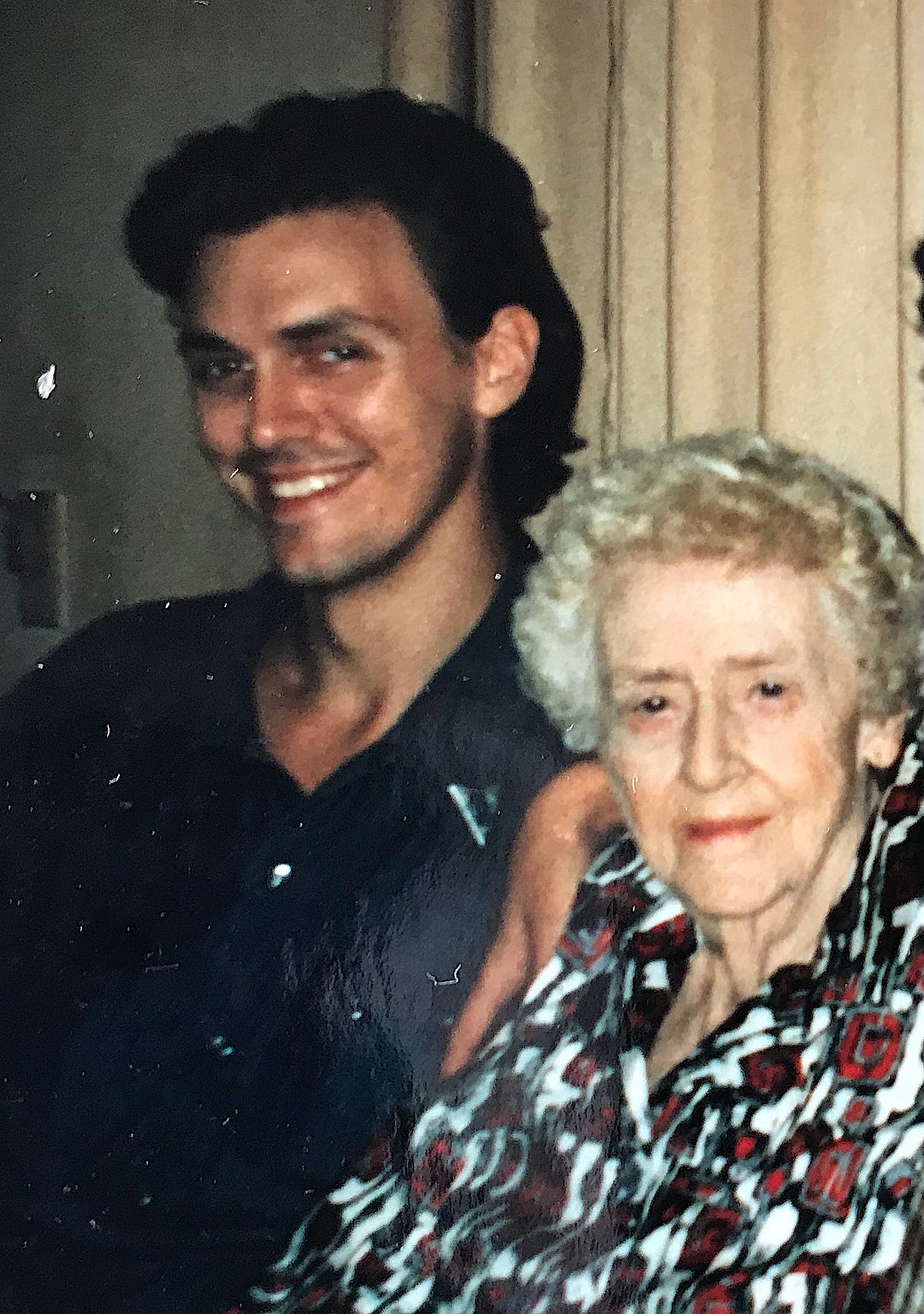Visiting Durham, 1984
Robert Burke Warren recalls an impromptu visit he made to his estranged grandparents at 19.
My paternal grandparents lived at 2303 West Club Boulevard, in Durham, North Carolina. My father grew up there. As I age and forget things, that address remains emblazoned on a part of my brain unaffected by the ravages of time. Also crystallized therein: 70s jingles, names of fellow children I loved and loathed, and the cadences of adult voices overhead.
We lived in Atlanta—at 120 Terrace Drive, 404-261-4939. I recall mostly happy visits to Durham when I was very small. Granddaddy Warren could be ornery, but my grandmother Annie Mae was affectionate and kind. She made sure my brother and I knew she loved us. Lots of hugging and teary smiles and gifts from Kmart.
I recall mostly happy visits to Durham when I was very small. Granddaddy Warren could be ornery, but my grandmother Annie Mae was affectionate and kind.
After our dad died in ’72, however, we lost touch with my North Carolina kin. With the approach of adolescence, life became increasingly chaotic. Mom could not abide my grandfather. The Warrens receded from our lives.
In those fraught years, I would learn Granddaddy and Grandmother Warren were recovering alcoholics, and that my dad had been an alcoholic and was very drunk when he crashed his Chevy Impala into an embankment and died.
In 1984, I turned 19 in a tin-ceilinged room of an antebellum house at 607 Cobb St in Athens, Georgia. I played bass in the band Go Van Go, and I paid my few bills making xeroxes at Kinko’s. I was on my own for the first time, poor, happy, and full of energy.
One morning in early autumn of ‘84, I awoke with memories of my Durham family swirling in my head. I had several days off in a row with no shifts and no gigs. Without discussing it with anyone, and without alerting my grandparents, I jumped in my circa early 70s Plymouth Duster and drove north on I-85. I was all impulse in those days. It was about a five-hour drive.
I arrived in Durham beneath an orangey sunset. Strangely, although I’d never visited on my own, I knew the exact route to 2303 West Club Boulevard. I needed no map. I swallowed my nervousness and called from a payphone (the Warrens were listed). Grandmother Warren answered.
After our dad died in ’72, however, we lost touch with my North Carolina kin. With the approach of adolescence, life became increasingly chaotic. Mom could not abide my grandfather. The Warrens receded from our lives.
“It’s Robert. Your grandson. I’m in town.”
She was immediately overjoyed. “Oh! Oh! Come and see us! COME AND STAY!”
I walked into the bungalow and embraced the visibly stunned old couple. Shorter, slighter versions of who I remembered, though not that different. Charley T., slim, with Coke bottle glasses (I inherited my lazy eye from him), round Annie Mae, with the deep-set eyes, heavily-bagged. I was now a 6’2” 165 pound 19-year-old, from the neck down a dead ringer for their deceased son, my namesake.
The house looked and smelled exactly as it had in my childhood; heavy with my grandmother’s Benson & Hedges 100s, and dimly lit. It was a sad little house, and of course smaller than I recalled.
“You favor your mother in the face,” Grandmother Warren said. I can still see their astonishment. In retrospect, my inconsideration, my usage of the element of surprise, feels softly cruel. But I do not regret it.
We sat in the shadowy den and chatted for a couple hours in the glow of the TV, which clearly was getting a lot of use. They each occupied a La-Z-Boy at opposite ends of the room. I perched on the edge of a little-used loveseat. It started as a convivial reunion. Granddaddy Warren was unusually chill. It occurs to me he was talking to me "like a man," and I was able to respond in kind. I didn't need a pat on the head.
One morning in early autumn of ‘84, I awoke with memories of my Durham family swirling in my head. I had several days off in a row with no shifts and no gigs. Without discussing it with anyone, and without alerting my grandparents, I jumped in my circa early 70s Plymouth Duster and drove north on I-85.
I lay down on the bed in which my brother and I had slept as children, the same loudly ticking clock on the same bedside table. With my presence removed, and perhaps with the novelty worn off, the air shifted beyond the French doors with the smoke-stained curtains, way in the back of the house. I could hear Granddaddy Warren arguing with Annie Mae in the kitchen, telling her she shouldn’t have to alter her plans for me. She murmured angrily.
I began to think maybe I'd made a mistake. And yet I slept. I was much less given to rumination in those days.
I don’t know what Grandmother Warren's plans had been, but she defied Granddaddy Warren. (They were both retired.) In the morning he was not around. Annie Mae and I went to Shoney’s, her favorite restaurant. We chatted, catching up. It was surprisingly effortless, blood-on-blood. We both drank a lot of coffee. She brought me up to speed on my Warren cousins—my father's brother's family, who lived in Medfield, Massachusetts. As with my Durham grandparents, we’d not stayed in touch with them. My beautiful cousin Robin had once been my pen pal, but when puberty hit, I hadn't kept it up. Grandmother Warren told me Robin had suffered a terrible, life-changing head injury. This revelation briefly bent my grandmother’s shoulders. In a sequence of moments I only now fully understand, she inhaled sharply, gathered her wits, and re-focused on me, there, then.
Grandmother Warren told me I was welcome to stay for as long as I liked, but she knew as she said it that I would be heading back to my life, immediately. She embraced me long and hard in the Shoney's parking lot, and bade me a tearful farewell, just like when I was tiny.
I headed south, both exhilarated and sad, but glad I'd followed my impulse. I took it as a sign I needed to do more of that, and I would. There is no one word in the English language to encompass my emotional state. I rolled the window down, breathed deep, and hit the accelerator.
I promised to stay in better touch with Grandmother Warren, but my life was about to enter its most peripatetic stage—to NYC, then touring the world, adventuring as only a 20-something coming of age in the ‘80s could.
I decided to drive the two-lane blacktops of the Blue Ridge Mountains, out of my way, but breathtakingly beautiful. Autumn colors were just coming on, brighter as I ascended. I took my time, stopped at a diner. Fatigue at last hit me and I pulled into a roadside motel in the Appalachians, amazed at the scent of curry wafting over the gravel parking lot. This was when I learned many Indian families had purchased motels all over the American South. More “Lessons of The Road” would soon follow.
I promised to stay in better touch with Grandmother Warren, but my life was about to enter its most peripatetic stage—to NYC, then touring the world, adventuring as only a 20-something coming of age in the ‘80s could. Perhaps on that autumn day in Athens, with responsibility not yet heavy on me, I knew change was afoot, and the time was ripe to make a connection while I still could. There was wisdom in my gut. Indeed, the coming years were to mark one of the happiest, most untethered periods of my life.
I would see Annie Mae only twice more—at my 1989 wedding, a tumultuous affair where she was visibly frail and I had barely a moment to stop and say hello, and a brief visit shortly thereafter with my new wife, Holly, in 1990, during which Grandaddy Warren would not leave their bedroom to say hello. He would die later that year. Annie Mae would pass in '91. So that 1990 visit was our last goodbye. Again, she smiled with tears in her raccoon-ish eyes.
I am moving ever closer to the era in which I am the one bidding the tearful farewell to the kin heading out into the world. I am the one on the porch, the train platform, in the airline terminal, on the floorboards of my child’s own home, embracing them now with tears.
I think about those tearful farewells more and more. I appreciated them at the time, but honestly, the younger I was, the more they were like water off a duck's back. I had so much to do, and I lived more in the present than at any other time in my life, before or since. I was awash in hormones, compelled by what my body—as opposed to my mind—was telling me. I have few regrets from this period.
But now it's different. Of course it is. I am moving ever closer to the era in which I am the one bidding the tearful farewell to the kin heading out into the world. I am the one on the porch, the train platform, in the airline terminal, on the floorboards of my child’s own home, embracing them now with tears. Tears connecting me to my elders across time and space. Compassion delayed, but still. Meanwhile, the farewelling youngster is sweet, as I was, but, thankfully, largely unmoved, as I was. There's so much to do.
I feel fortunate to have reached this place, but of course also sad. Yet glad. And vicariously excited. Again—there is no single word I can think of to encompass everything I feel. Except perhaps: connection. And gratitude. Gratitude that I experienced that love when I needed it, even though I didn't consciously grasp its depth and nurturance at the time, and gratitude that I am able now to pass it on in similar fashion.
Thank you, Grandmother Warren. I remember. Your love lives on.








So moving. Beautifully rendered.
Lovely.